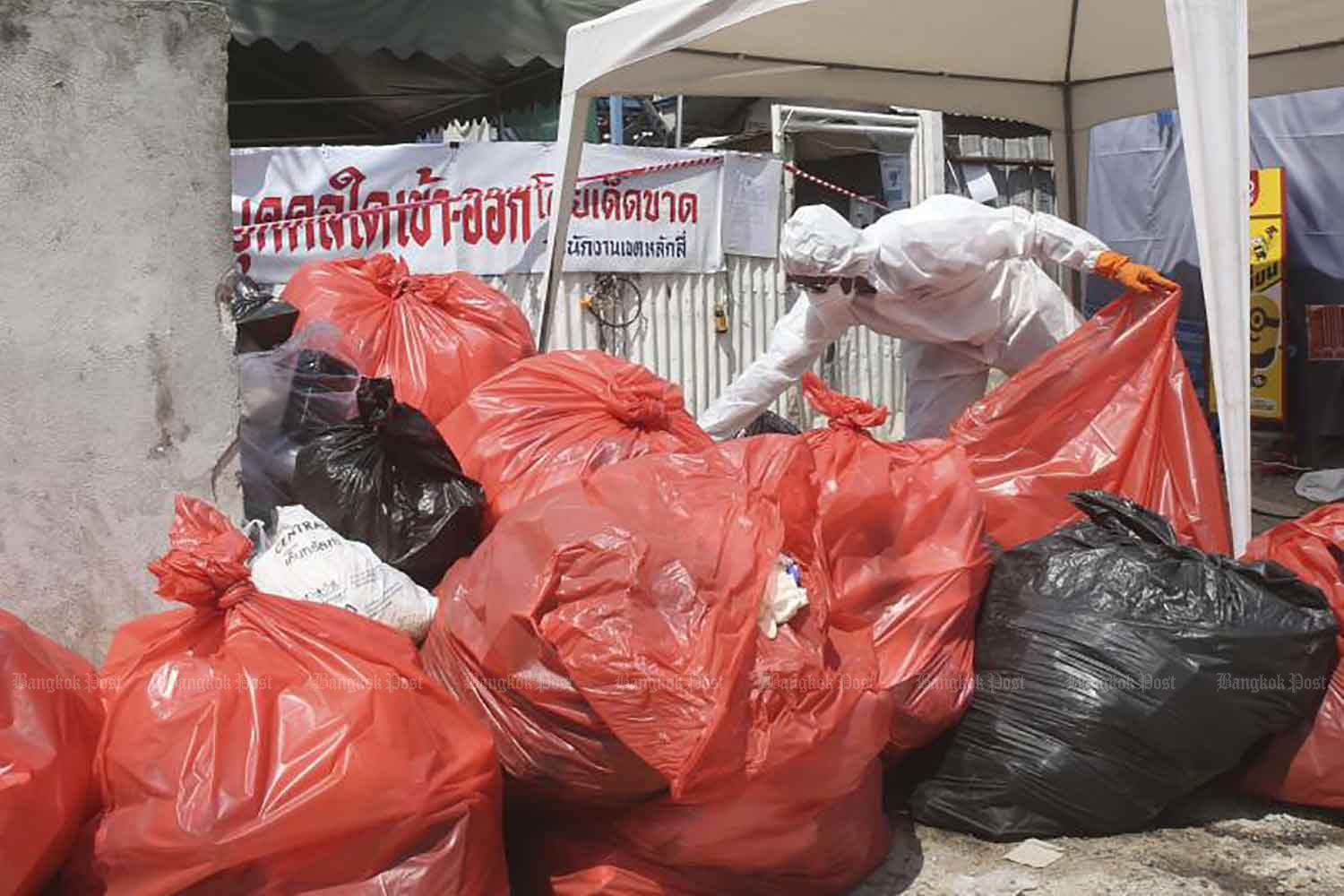
Infectious waste is starting to pile up across the country as the Covid-19 pandemic continues -- most notably in Bangkok and Nonthaburi, where the amount of waste is quickly exceeding the capacity of local incinerators.
Nevertheless, the Department of Health assured that it has a plan in place to deal with the growing amount of infectious waste during the pandemic. In addition to urging households to sort out their rubbish properly, the department said it is planning to contract industrial waste processing facilities to help with their disposal.
Mountains of red bags containing a plethora of infectious rubbish from hospitals and other Covid isolation facilities can be seen looming over the workers at Nonthaburi Provincial Administrative Organisation's (PAO) waste processing facility in Sai Noi district.
The sight, said a worker at the facility, is a worrying one.
The worker said, the pile -- now weighing over 500 tonnes -- is growing everyday because the incinerator on site simply cannot cope with the increasing amount of waste it has to process.
The growing pile has sparked concerns about the facility's workers, as well as the area's residents, who fear the prospect of an outbreak caused by an improperly tied biohazard bag.
According to the Bangkok Metropolitan Administration (BMA) figures, around 38% of all contaminated waste collected by authorities in Bangkok and its surrounding provinces has traces of Covid-19 in it.
Chief of Nonthaburi PAO, Thongchai Yenprasert, said around 30 tonnes of infectious waste are collected every day from more than 500 hospitals, clinics, and other health facilities in the province.
The province's infectious waste incinerator, however, only has the capacity to incinerate around 16 tonnes per day.
"We are currently working with Health Department to find a solution. But for now, only infectious waste from within the province will be processed at Nonthaburi PAO's incinerator, as a short-term measure," Pol Col Thongchai said.

Suwannachai Wattanayingcharoenchai, Health Department director-general, said Nonthaburi isn't the only province that is struggling under the weight of its infectious waste.
Other provinces including Ayutthaya, Rayong and Ubon Ratchathani have also seen their incinerators overwhelmed by the rapidly growing amount of biohazardous material which needs to be processed.
According to the department's data, some 100 tonnes of infectious waste are collected across Bangkok each day. The city's incinerators, however, are only capable of processing 70 tonnes a day.
"We've heard that in July, an average of 273 tonnes [of infectious waste] were picked up every day. Waste management facilities across the country can only process 275 tonnes each day, so the situation isn't so good," Dr Suwannachai said.
He blamed the problem on the recent spike in Covid-19 cases, which meant more people used and discarded materials which have to be processed separately.
That said, he assured the public not to worry about the growing problem, as the department has already prepared a plan for the situation.
"We are now collaborating with the Industrial Works Department to select industrial waste management companies, which have waste incinerators that meet the Health Department's high standard, to dispose of the excess waste," he said.
"We also plan to reduce infectious waste at its source by encouraging hospitals, healthcare facilities and patients in home isolation to sort out their medical waste and disinfect them with bleach, which can kill the Covid-19 virus and most pathogens, prior to disposal."
He also said Thailand has a good infectious waste management system, which helps to ensure that workers and local residents are protected against accidental contamination.
Medical waste, he said, is placed in two waterproof plastic bags before being put through special incinerators to prevent leaks and contamination.
"Unless the bags are damaged, there is zero chance of pathogens from the infectious waste bags leaking. Moreover, the waste is stored far from residential areas," he added.